MNG03236 Business Professional Development Report: Self-Analysis
VerifiedAdded on 2022/10/18
|14
|3481
|64
Report
AI Summary
This report provides a comprehensive self-assessment of Kajal Prajapati's professional skills and abilities, focusing on her suitability for an assistant manager position in the hospitality industry. The analysis covers various aspects, including personality traits (introversion, conscientiousness), values, motivators, emotional intelligence, leadership style, and understanding of power and politics. Kajal utilizes personality tests (Myers-Briggs, Big Five) and emotional intelligence assessments to evaluate her strengths and weaknesses, highlighting her strengths in self-awareness, self-management, and social awareness. The report details her aspirations for leadership, decision-making processes, and her approach to power and politics within an organization. The conclusion summarizes her capabilities and readiness to take on the responsibilities of an assistant manager. The report also includes appendices containing test results and related information. The report also highlights the importance of self-awareness in career development.
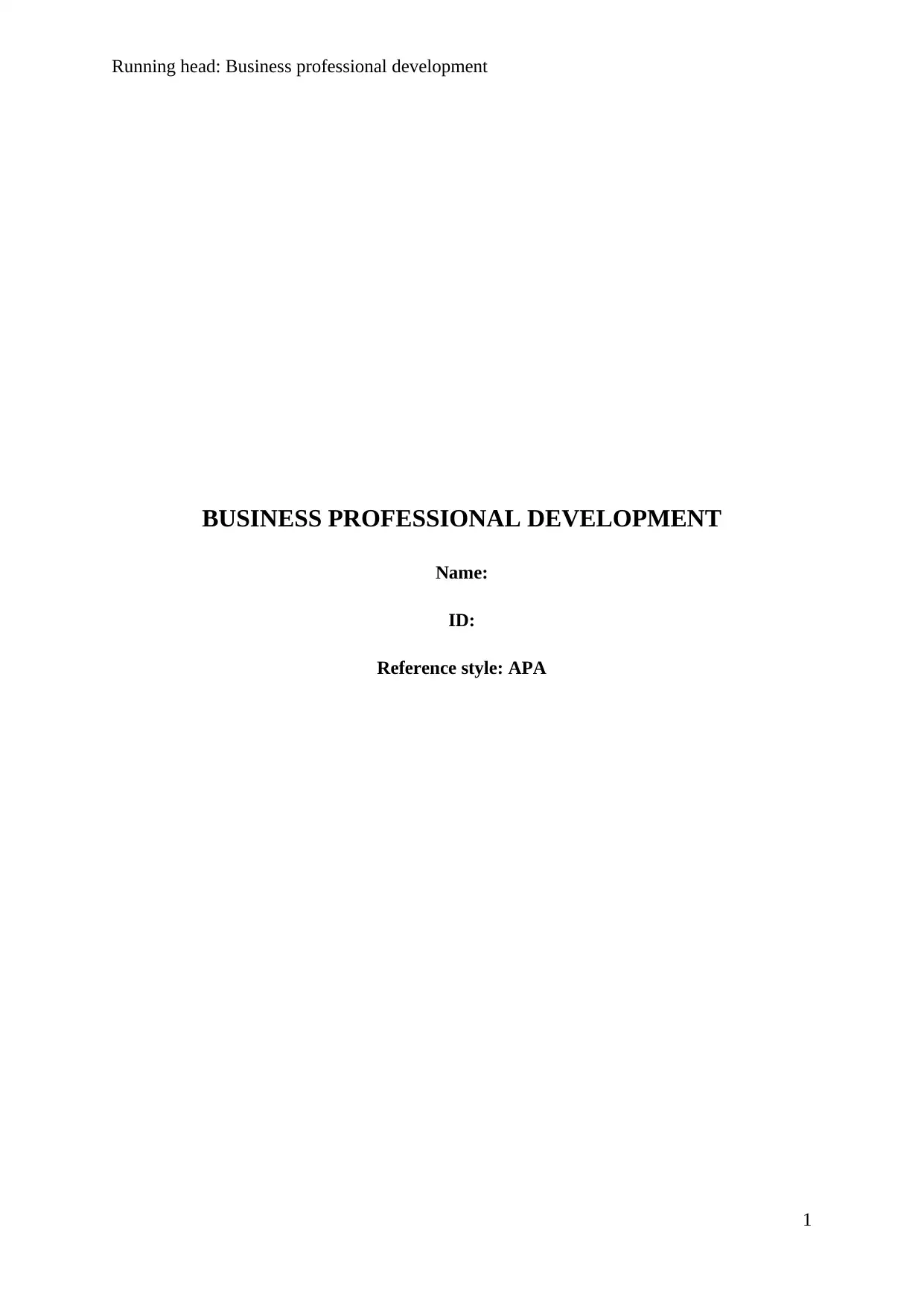
Running head: Business professional development
BUSINESS PROFESSIONAL DEVELOPMENT
Name:
ID:
Reference style: APA
1
BUSINESS PROFESSIONAL DEVELOPMENT
Name:
ID:
Reference style: APA
1
Paraphrase This Document
Need a fresh take? Get an instant paraphrase of this document with our AI Paraphraser
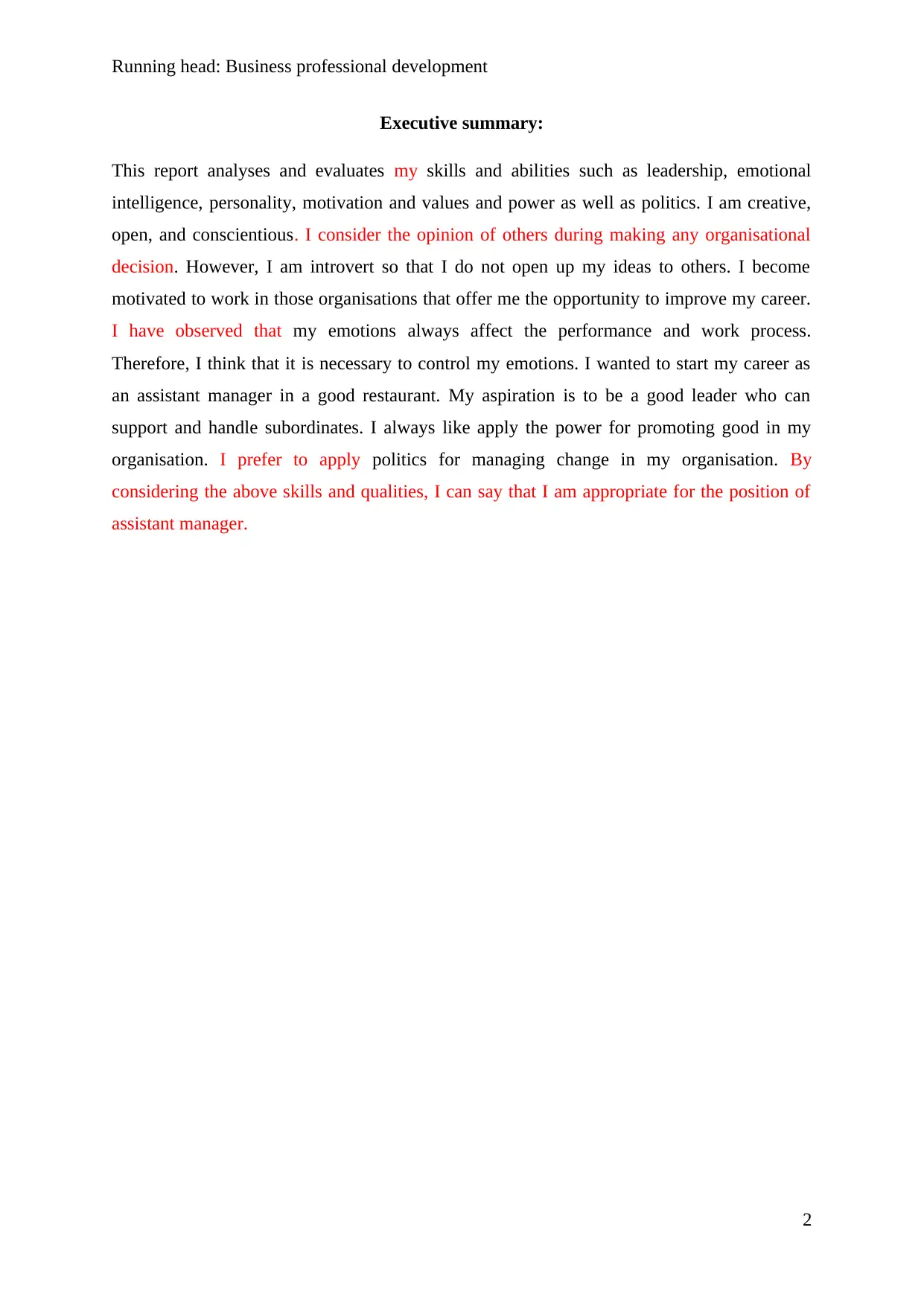
Running head: Business professional development
Executive summary:
This report analyses and evaluates my skills and abilities such as leadership, emotional
intelligence, personality, motivation and values and power as well as politics. I am creative,
open, and conscientious. I consider the opinion of others during making any organisational
decision. However, I am introvert so that I do not open up my ideas to others. I become
motivated to work in those organisations that offer me the opportunity to improve my career.
I have observed that my emotions always affect the performance and work process.
Therefore, I think that it is necessary to control my emotions. I wanted to start my career as
an assistant manager in a good restaurant. My aspiration is to be a good leader who can
support and handle subordinates. I always like apply the power for promoting good in my
organisation. I prefer to apply politics for managing change in my organisation. By
considering the above skills and qualities, I can say that I am appropriate for the position of
assistant manager.
2
Executive summary:
This report analyses and evaluates my skills and abilities such as leadership, emotional
intelligence, personality, motivation and values and power as well as politics. I am creative,
open, and conscientious. I consider the opinion of others during making any organisational
decision. However, I am introvert so that I do not open up my ideas to others. I become
motivated to work in those organisations that offer me the opportunity to improve my career.
I have observed that my emotions always affect the performance and work process.
Therefore, I think that it is necessary to control my emotions. I wanted to start my career as
an assistant manager in a good restaurant. My aspiration is to be a good leader who can
support and handle subordinates. I always like apply the power for promoting good in my
organisation. I prefer to apply politics for managing change in my organisation. By
considering the above skills and qualities, I can say that I am appropriate for the position of
assistant manager.
2
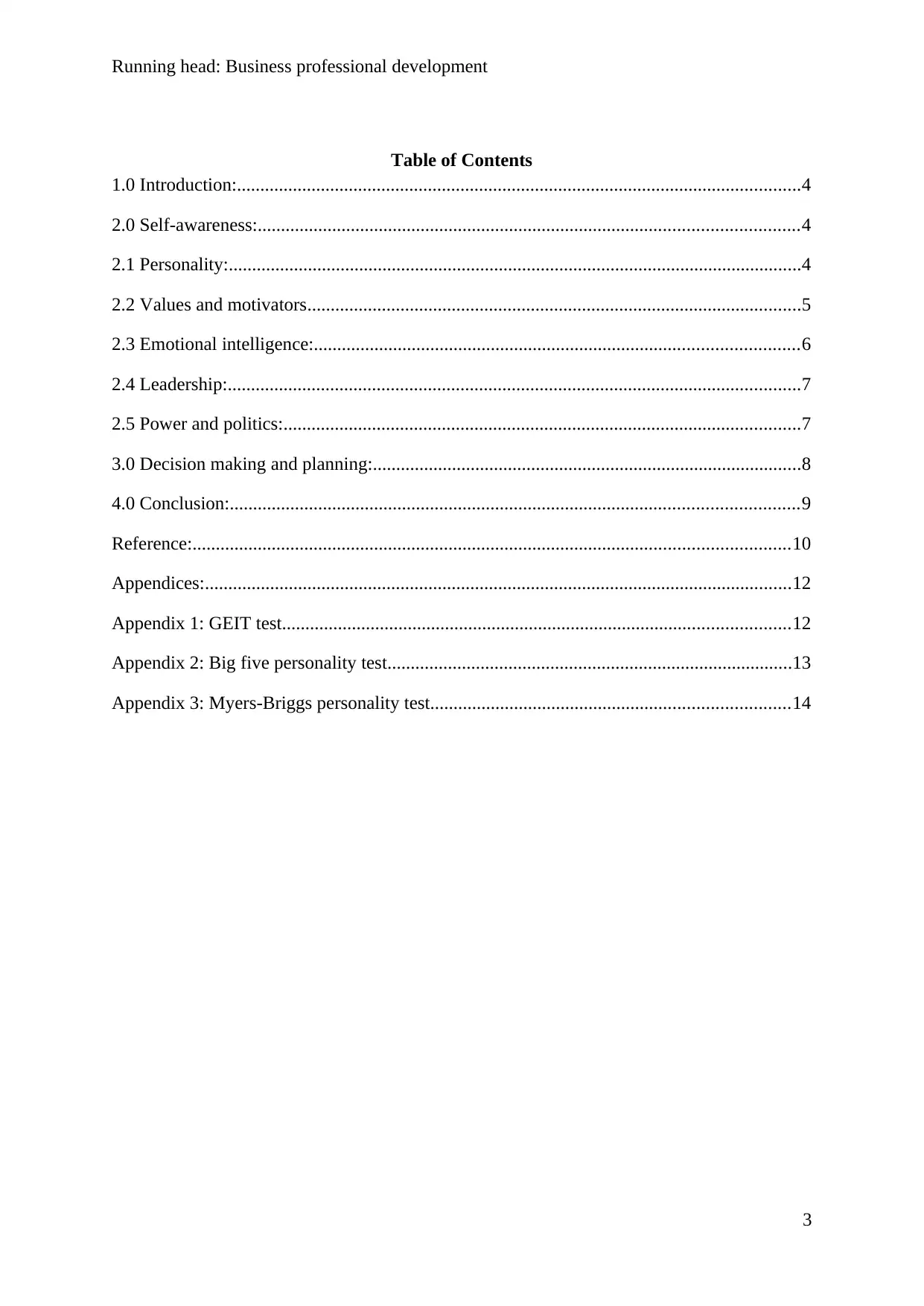
Running head: Business professional development
Table of Contents
1.0 Introduction:.........................................................................................................................4
2.0 Self-awareness:....................................................................................................................4
2.1 Personality:...........................................................................................................................4
2.2 Values and motivators..........................................................................................................5
2.3 Emotional intelligence:........................................................................................................6
2.4 Leadership:...........................................................................................................................7
2.5 Power and politics:...............................................................................................................7
3.0 Decision making and planning:............................................................................................8
4.0 Conclusion:..........................................................................................................................9
Reference:................................................................................................................................10
Appendices:..............................................................................................................................12
Appendix 1: GEIT test.............................................................................................................12
Appendix 2: Big five personality test.......................................................................................13
Appendix 3: Myers-Briggs personality test.............................................................................14
3
Table of Contents
1.0 Introduction:.........................................................................................................................4
2.0 Self-awareness:....................................................................................................................4
2.1 Personality:...........................................................................................................................4
2.2 Values and motivators..........................................................................................................5
2.3 Emotional intelligence:........................................................................................................6
2.4 Leadership:...........................................................................................................................7
2.5 Power and politics:...............................................................................................................7
3.0 Decision making and planning:............................................................................................8
4.0 Conclusion:..........................................................................................................................9
Reference:................................................................................................................................10
Appendices:..............................................................................................................................12
Appendix 1: GEIT test.............................................................................................................12
Appendix 2: Big five personality test.......................................................................................13
Appendix 3: Myers-Briggs personality test.............................................................................14
3
⊘ This is a preview!⊘
Do you want full access?
Subscribe today to unlock all pages.

Trusted by 1+ million students worldwide
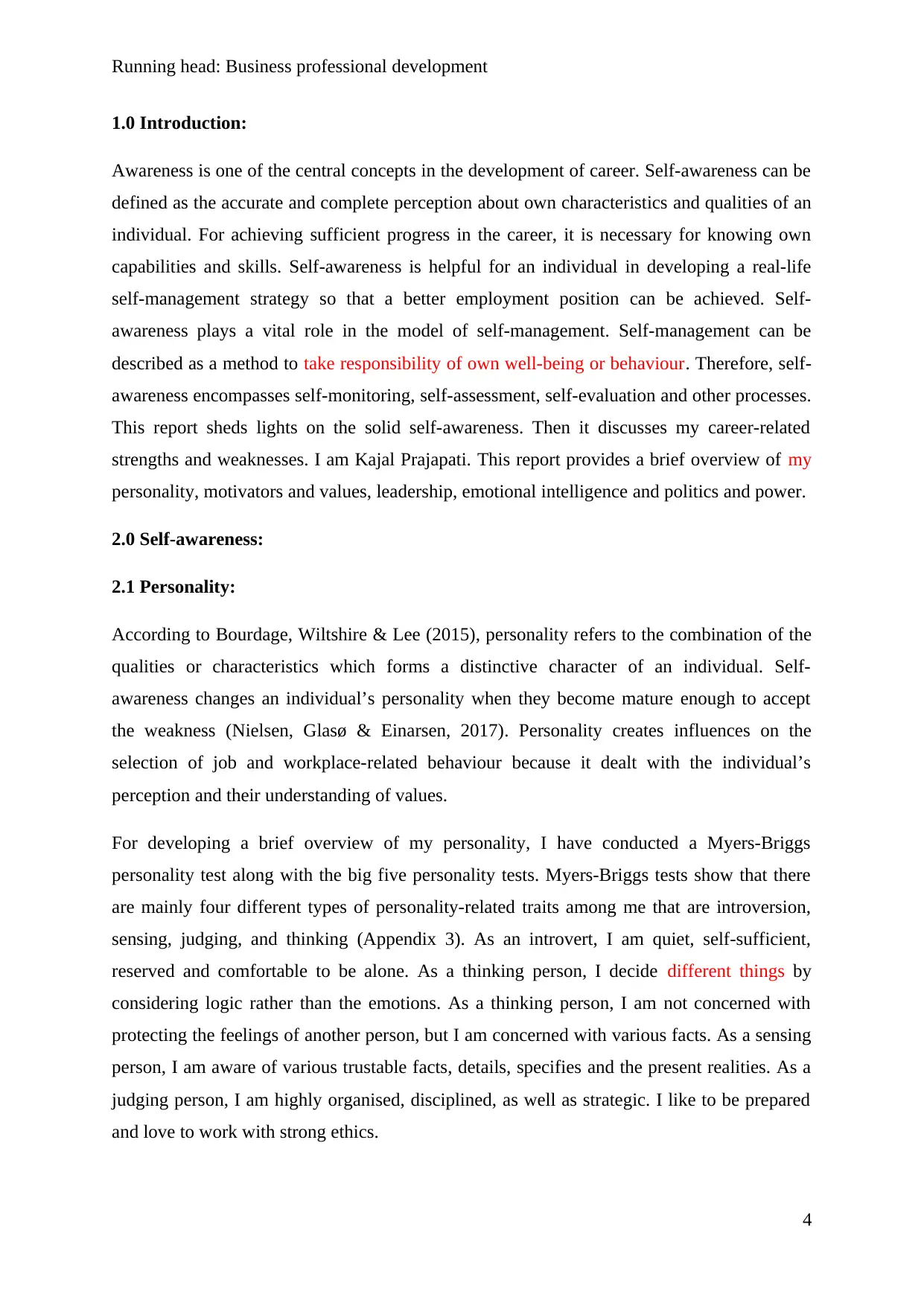
Running head: Business professional development
1.0 Introduction:
Awareness is one of the central concepts in the development of career. Self-awareness can be
defined as the accurate and complete perception about own characteristics and qualities of an
individual. For achieving sufficient progress in the career, it is necessary for knowing own
capabilities and skills. Self-awareness is helpful for an individual in developing a real-life
self-management strategy so that a better employment position can be achieved. Self-
awareness plays a vital role in the model of self-management. Self-management can be
described as a method to take responsibility of own well-being or behaviour. Therefore, self-
awareness encompasses self-monitoring, self-assessment, self-evaluation and other processes.
This report sheds lights on the solid self-awareness. Then it discusses my career-related
strengths and weaknesses. I am Kajal Prajapati. This report provides a brief overview of my
personality, motivators and values, leadership, emotional intelligence and politics and power.
2.0 Self-awareness:
2.1 Personality:
According to Bourdage, Wiltshire & Lee (2015), personality refers to the combination of the
qualities or characteristics which forms a distinctive character of an individual. Self-
awareness changes an individual’s personality when they become mature enough to accept
the weakness (Nielsen, Glasø & Einarsen, 2017). Personality creates influences on the
selection of job and workplace-related behaviour because it dealt with the individual’s
perception and their understanding of values.
For developing a brief overview of my personality, I have conducted a Myers-Briggs
personality test along with the big five personality tests. Myers-Briggs tests show that there
are mainly four different types of personality-related traits among me that are introversion,
sensing, judging, and thinking (Appendix 3). As an introvert, I am quiet, self-sufficient,
reserved and comfortable to be alone. As a thinking person, I decide different things by
considering logic rather than the emotions. As a thinking person, I am not concerned with
protecting the feelings of another person, but I am concerned with various facts. As a sensing
person, I am aware of various trustable facts, details, specifies and the present realities. As a
judging person, I am highly organised, disciplined, as well as strategic. I like to be prepared
and love to work with strong ethics.
4
1.0 Introduction:
Awareness is one of the central concepts in the development of career. Self-awareness can be
defined as the accurate and complete perception about own characteristics and qualities of an
individual. For achieving sufficient progress in the career, it is necessary for knowing own
capabilities and skills. Self-awareness is helpful for an individual in developing a real-life
self-management strategy so that a better employment position can be achieved. Self-
awareness plays a vital role in the model of self-management. Self-management can be
described as a method to take responsibility of own well-being or behaviour. Therefore, self-
awareness encompasses self-monitoring, self-assessment, self-evaluation and other processes.
This report sheds lights on the solid self-awareness. Then it discusses my career-related
strengths and weaknesses. I am Kajal Prajapati. This report provides a brief overview of my
personality, motivators and values, leadership, emotional intelligence and politics and power.
2.0 Self-awareness:
2.1 Personality:
According to Bourdage, Wiltshire & Lee (2015), personality refers to the combination of the
qualities or characteristics which forms a distinctive character of an individual. Self-
awareness changes an individual’s personality when they become mature enough to accept
the weakness (Nielsen, Glasø & Einarsen, 2017). Personality creates influences on the
selection of job and workplace-related behaviour because it dealt with the individual’s
perception and their understanding of values.
For developing a brief overview of my personality, I have conducted a Myers-Briggs
personality test along with the big five personality tests. Myers-Briggs tests show that there
are mainly four different types of personality-related traits among me that are introversion,
sensing, judging, and thinking (Appendix 3). As an introvert, I am quiet, self-sufficient,
reserved and comfortable to be alone. As a thinking person, I decide different things by
considering logic rather than the emotions. As a thinking person, I am not concerned with
protecting the feelings of another person, but I am concerned with various facts. As a sensing
person, I am aware of various trustable facts, details, specifies and the present realities. As a
judging person, I am highly organised, disciplined, as well as strategic. I like to be prepared
and love to work with strong ethics.
4
Paraphrase This Document
Need a fresh take? Get an instant paraphrase of this document with our AI Paraphraser
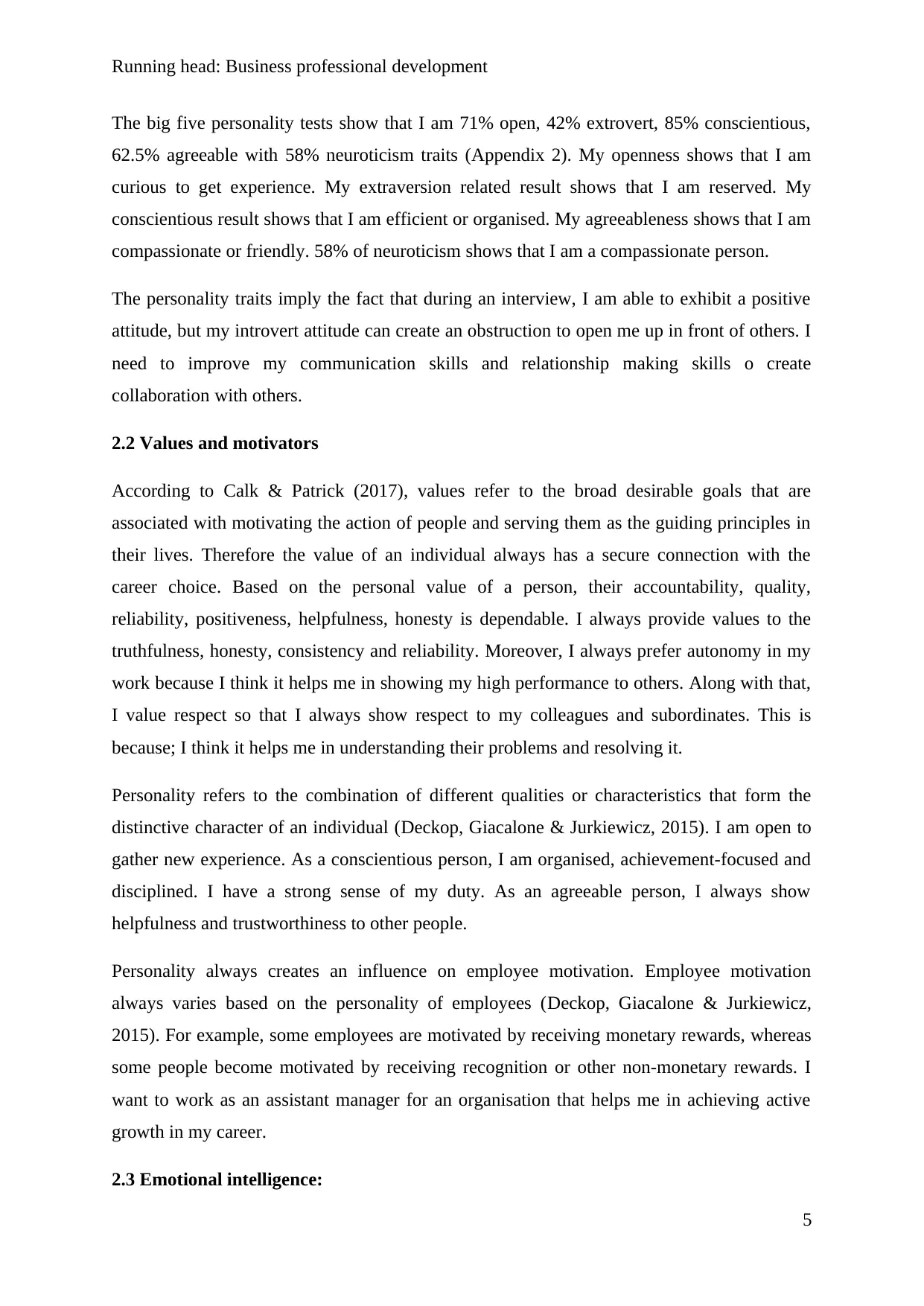
Running head: Business professional development
The big five personality tests show that I am 71% open, 42% extrovert, 85% conscientious,
62.5% agreeable with 58% neuroticism traits (Appendix 2). My openness shows that I am
curious to get experience. My extraversion related result shows that I am reserved. My
conscientious result shows that I am efficient or organised. My agreeableness shows that I am
compassionate or friendly. 58% of neuroticism shows that I am a compassionate person.
The personality traits imply the fact that during an interview, I am able to exhibit a positive
attitude, but my introvert attitude can create an obstruction to open me up in front of others. I
need to improve my communication skills and relationship making skills o create
collaboration with others.
2.2 Values and motivators
According to Calk & Patrick (2017), values refer to the broad desirable goals that are
associated with motivating the action of people and serving them as the guiding principles in
their lives. Therefore the value of an individual always has a secure connection with the
career choice. Based on the personal value of a person, their accountability, quality,
reliability, positiveness, helpfulness, honesty is dependable. I always provide values to the
truthfulness, honesty, consistency and reliability. Moreover, I always prefer autonomy in my
work because I think it helps me in showing my high performance to others. Along with that,
I value respect so that I always show respect to my colleagues and subordinates. This is
because; I think it helps me in understanding their problems and resolving it.
Personality refers to the combination of different qualities or characteristics that form the
distinctive character of an individual (Deckop, Giacalone & Jurkiewicz, 2015). I am open to
gather new experience. As a conscientious person, I am organised, achievement-focused and
disciplined. I have a strong sense of my duty. As an agreeable person, I always show
helpfulness and trustworthiness to other people.
Personality always creates an influence on employee motivation. Employee motivation
always varies based on the personality of employees (Deckop, Giacalone & Jurkiewicz,
2015). For example, some employees are motivated by receiving monetary rewards, whereas
some people become motivated by receiving recognition or other non-monetary rewards. I
want to work as an assistant manager for an organisation that helps me in achieving active
growth in my career.
2.3 Emotional intelligence:
5
The big five personality tests show that I am 71% open, 42% extrovert, 85% conscientious,
62.5% agreeable with 58% neuroticism traits (Appendix 2). My openness shows that I am
curious to get experience. My extraversion related result shows that I am reserved. My
conscientious result shows that I am efficient or organised. My agreeableness shows that I am
compassionate or friendly. 58% of neuroticism shows that I am a compassionate person.
The personality traits imply the fact that during an interview, I am able to exhibit a positive
attitude, but my introvert attitude can create an obstruction to open me up in front of others. I
need to improve my communication skills and relationship making skills o create
collaboration with others.
2.2 Values and motivators
According to Calk & Patrick (2017), values refer to the broad desirable goals that are
associated with motivating the action of people and serving them as the guiding principles in
their lives. Therefore the value of an individual always has a secure connection with the
career choice. Based on the personal value of a person, their accountability, quality,
reliability, positiveness, helpfulness, honesty is dependable. I always provide values to the
truthfulness, honesty, consistency and reliability. Moreover, I always prefer autonomy in my
work because I think it helps me in showing my high performance to others. Along with that,
I value respect so that I always show respect to my colleagues and subordinates. This is
because; I think it helps me in understanding their problems and resolving it.
Personality refers to the combination of different qualities or characteristics that form the
distinctive character of an individual (Deckop, Giacalone & Jurkiewicz, 2015). I am open to
gather new experience. As a conscientious person, I am organised, achievement-focused and
disciplined. I have a strong sense of my duty. As an agreeable person, I always show
helpfulness and trustworthiness to other people.
Personality always creates an influence on employee motivation. Employee motivation
always varies based on the personality of employees (Deckop, Giacalone & Jurkiewicz,
2015). For example, some employees are motivated by receiving monetary rewards, whereas
some people become motivated by receiving recognition or other non-monetary rewards. I
want to work as an assistant manager for an organisation that helps me in achieving active
growth in my career.
2.3 Emotional intelligence:
5
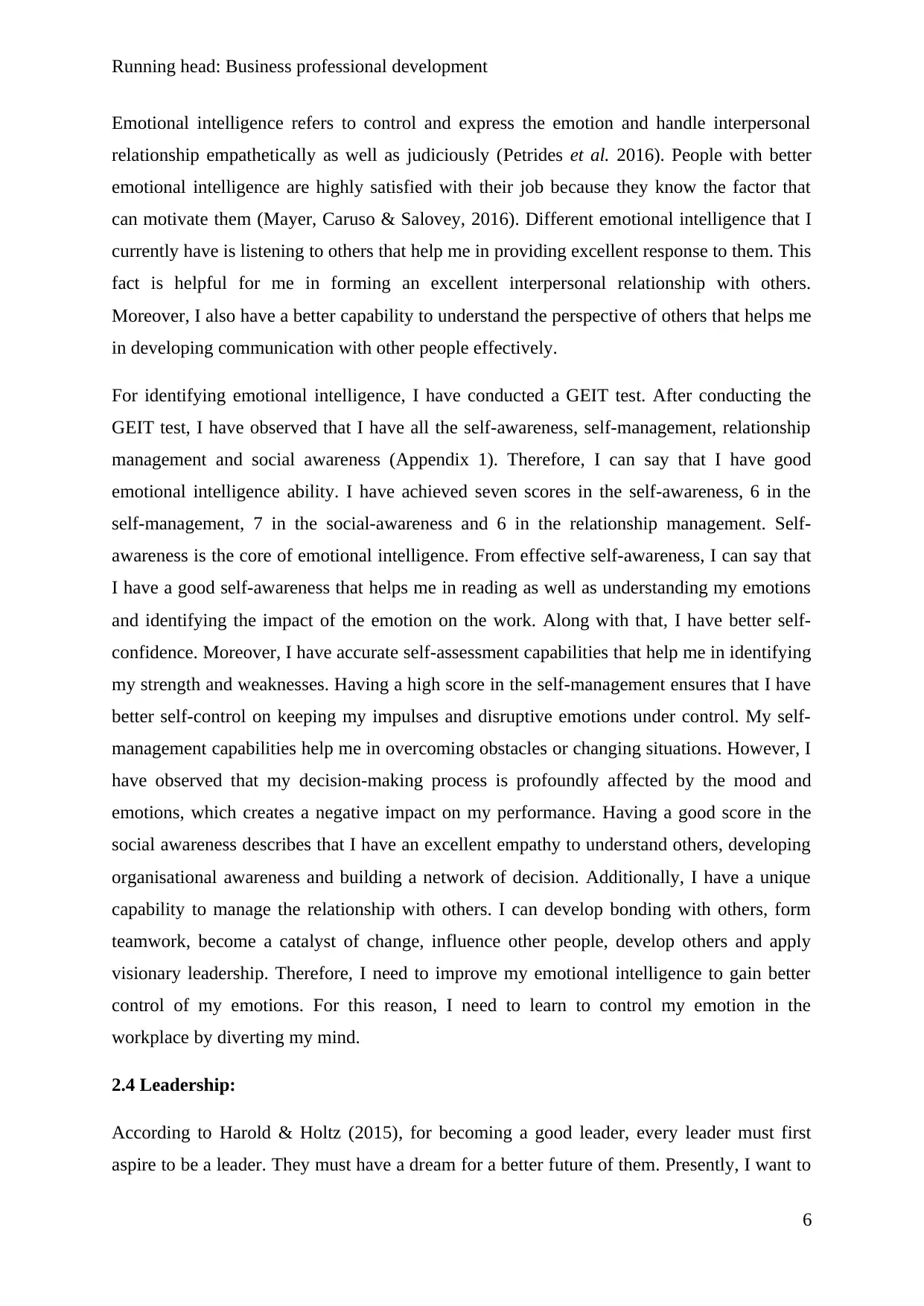
Running head: Business professional development
Emotional intelligence refers to control and express the emotion and handle interpersonal
relationship empathetically as well as judiciously (Petrides et al. 2016). People with better
emotional intelligence are highly satisfied with their job because they know the factor that
can motivate them (Mayer, Caruso & Salovey, 2016). Different emotional intelligence that I
currently have is listening to others that help me in providing excellent response to them. This
fact is helpful for me in forming an excellent interpersonal relationship with others.
Moreover, I also have a better capability to understand the perspective of others that helps me
in developing communication with other people effectively.
For identifying emotional intelligence, I have conducted a GEIT test. After conducting the
GEIT test, I have observed that I have all the self-awareness, self-management, relationship
management and social awareness (Appendix 1). Therefore, I can say that I have good
emotional intelligence ability. I have achieved seven scores in the self-awareness, 6 in the
self-management, 7 in the social-awareness and 6 in the relationship management. Self-
awareness is the core of emotional intelligence. From effective self-awareness, I can say that
I have a good self-awareness that helps me in reading as well as understanding my emotions
and identifying the impact of the emotion on the work. Along with that, I have better self-
confidence. Moreover, I have accurate self-assessment capabilities that help me in identifying
my strength and weaknesses. Having a high score in the self-management ensures that I have
better self-control on keeping my impulses and disruptive emotions under control. My self-
management capabilities help me in overcoming obstacles or changing situations. However, I
have observed that my decision-making process is profoundly affected by the mood and
emotions, which creates a negative impact on my performance. Having a good score in the
social awareness describes that I have an excellent empathy to understand others, developing
organisational awareness and building a network of decision. Additionally, I have a unique
capability to manage the relationship with others. I can develop bonding with others, form
teamwork, become a catalyst of change, influence other people, develop others and apply
visionary leadership. Therefore, I need to improve my emotional intelligence to gain better
control of my emotions. For this reason, I need to learn to control my emotion in the
workplace by diverting my mind.
2.4 Leadership:
According to Harold & Holtz (2015), for becoming a good leader, every leader must first
aspire to be a leader. They must have a dream for a better future of them. Presently, I want to
6
Emotional intelligence refers to control and express the emotion and handle interpersonal
relationship empathetically as well as judiciously (Petrides et al. 2016). People with better
emotional intelligence are highly satisfied with their job because they know the factor that
can motivate them (Mayer, Caruso & Salovey, 2016). Different emotional intelligence that I
currently have is listening to others that help me in providing excellent response to them. This
fact is helpful for me in forming an excellent interpersonal relationship with others.
Moreover, I also have a better capability to understand the perspective of others that helps me
in developing communication with other people effectively.
For identifying emotional intelligence, I have conducted a GEIT test. After conducting the
GEIT test, I have observed that I have all the self-awareness, self-management, relationship
management and social awareness (Appendix 1). Therefore, I can say that I have good
emotional intelligence ability. I have achieved seven scores in the self-awareness, 6 in the
self-management, 7 in the social-awareness and 6 in the relationship management. Self-
awareness is the core of emotional intelligence. From effective self-awareness, I can say that
I have a good self-awareness that helps me in reading as well as understanding my emotions
and identifying the impact of the emotion on the work. Along with that, I have better self-
confidence. Moreover, I have accurate self-assessment capabilities that help me in identifying
my strength and weaknesses. Having a high score in the self-management ensures that I have
better self-control on keeping my impulses and disruptive emotions under control. My self-
management capabilities help me in overcoming obstacles or changing situations. However, I
have observed that my decision-making process is profoundly affected by the mood and
emotions, which creates a negative impact on my performance. Having a good score in the
social awareness describes that I have an excellent empathy to understand others, developing
organisational awareness and building a network of decision. Additionally, I have a unique
capability to manage the relationship with others. I can develop bonding with others, form
teamwork, become a catalyst of change, influence other people, develop others and apply
visionary leadership. Therefore, I need to improve my emotional intelligence to gain better
control of my emotions. For this reason, I need to learn to control my emotion in the
workplace by diverting my mind.
2.4 Leadership:
According to Harold & Holtz (2015), for becoming a good leader, every leader must first
aspire to be a leader. They must have a dream for a better future of them. Presently, I want to
6
⊘ This is a preview!⊘
Do you want full access?
Subscribe today to unlock all pages.

Trusted by 1+ million students worldwide
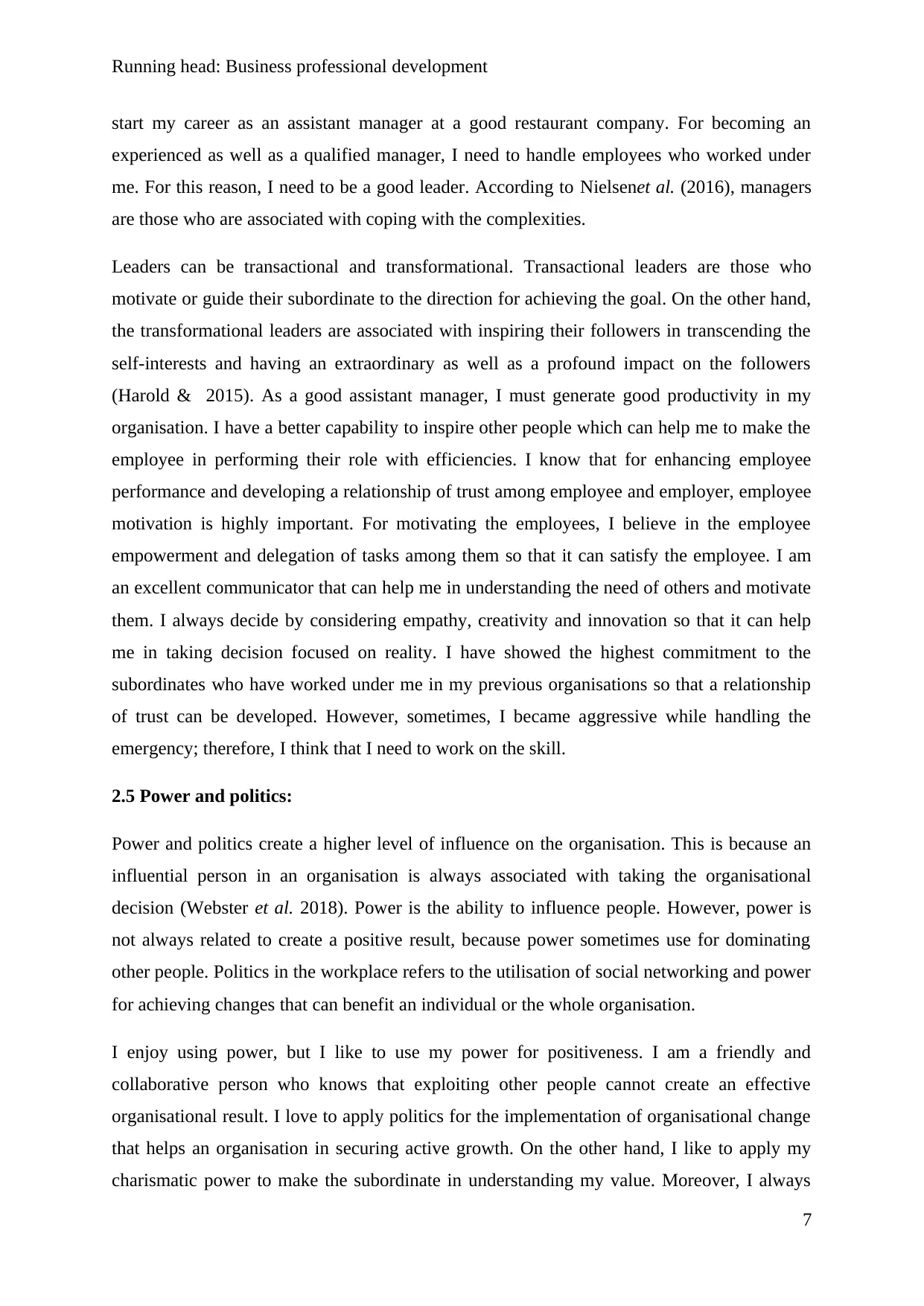
Running head: Business professional development
start my career as an assistant manager at a good restaurant company. For becoming an
experienced as well as a qualified manager, I need to handle employees who worked under
me. For this reason, I need to be a good leader. According to Nielsenet al. (2016), managers
are those who are associated with coping with the complexities.
Leaders can be transactional and transformational. Transactional leaders are those who
motivate or guide their subordinate to the direction for achieving the goal. On the other hand,
the transformational leaders are associated with inspiring their followers in transcending the
self-interests and having an extraordinary as well as a profound impact on the followers
(Harold & 2015). As a good assistant manager, I must generate good productivity in my
organisation. I have a better capability to inspire other people which can help me to make the
employee in performing their role with efficiencies. I know that for enhancing employee
performance and developing a relationship of trust among employee and employer, employee
motivation is highly important. For motivating the employees, I believe in the employee
empowerment and delegation of tasks among them so that it can satisfy the employee. I am
an excellent communicator that can help me in understanding the need of others and motivate
them. I always decide by considering empathy, creativity and innovation so that it can help
me in taking decision focused on reality. I have showed the highest commitment to the
subordinates who have worked under me in my previous organisations so that a relationship
of trust can be developed. However, sometimes, I became aggressive while handling the
emergency; therefore, I think that I need to work on the skill.
2.5 Power and politics:
Power and politics create a higher level of influence on the organisation. This is because an
influential person in an organisation is always associated with taking the organisational
decision (Webster et al. 2018). Power is the ability to influence people. However, power is
not always related to create a positive result, because power sometimes use for dominating
other people. Politics in the workplace refers to the utilisation of social networking and power
for achieving changes that can benefit an individual or the whole organisation.
I enjoy using power, but I like to use my power for positiveness. I am a friendly and
collaborative person who knows that exploiting other people cannot create an effective
organisational result. I love to apply politics for the implementation of organisational change
that helps an organisation in securing active growth. On the other hand, I like to apply my
charismatic power to make the subordinate in understanding my value. Moreover, I always
7
start my career as an assistant manager at a good restaurant company. For becoming an
experienced as well as a qualified manager, I need to handle employees who worked under
me. For this reason, I need to be a good leader. According to Nielsenet al. (2016), managers
are those who are associated with coping with the complexities.
Leaders can be transactional and transformational. Transactional leaders are those who
motivate or guide their subordinate to the direction for achieving the goal. On the other hand,
the transformational leaders are associated with inspiring their followers in transcending the
self-interests and having an extraordinary as well as a profound impact on the followers
(Harold & 2015). As a good assistant manager, I must generate good productivity in my
organisation. I have a better capability to inspire other people which can help me to make the
employee in performing their role with efficiencies. I know that for enhancing employee
performance and developing a relationship of trust among employee and employer, employee
motivation is highly important. For motivating the employees, I believe in the employee
empowerment and delegation of tasks among them so that it can satisfy the employee. I am
an excellent communicator that can help me in understanding the need of others and motivate
them. I always decide by considering empathy, creativity and innovation so that it can help
me in taking decision focused on reality. I have showed the highest commitment to the
subordinates who have worked under me in my previous organisations so that a relationship
of trust can be developed. However, sometimes, I became aggressive while handling the
emergency; therefore, I think that I need to work on the skill.
2.5 Power and politics:
Power and politics create a higher level of influence on the organisation. This is because an
influential person in an organisation is always associated with taking the organisational
decision (Webster et al. 2018). Power is the ability to influence people. However, power is
not always related to create a positive result, because power sometimes use for dominating
other people. Politics in the workplace refers to the utilisation of social networking and power
for achieving changes that can benefit an individual or the whole organisation.
I enjoy using power, but I like to use my power for positiveness. I am a friendly and
collaborative person who knows that exploiting other people cannot create an effective
organisational result. I love to apply politics for the implementation of organisational change
that helps an organisation in securing active growth. On the other hand, I like to apply my
charismatic power to make the subordinate in understanding my value. Moreover, I always
7
Paraphrase This Document
Need a fresh take? Get an instant paraphrase of this document with our AI Paraphraser
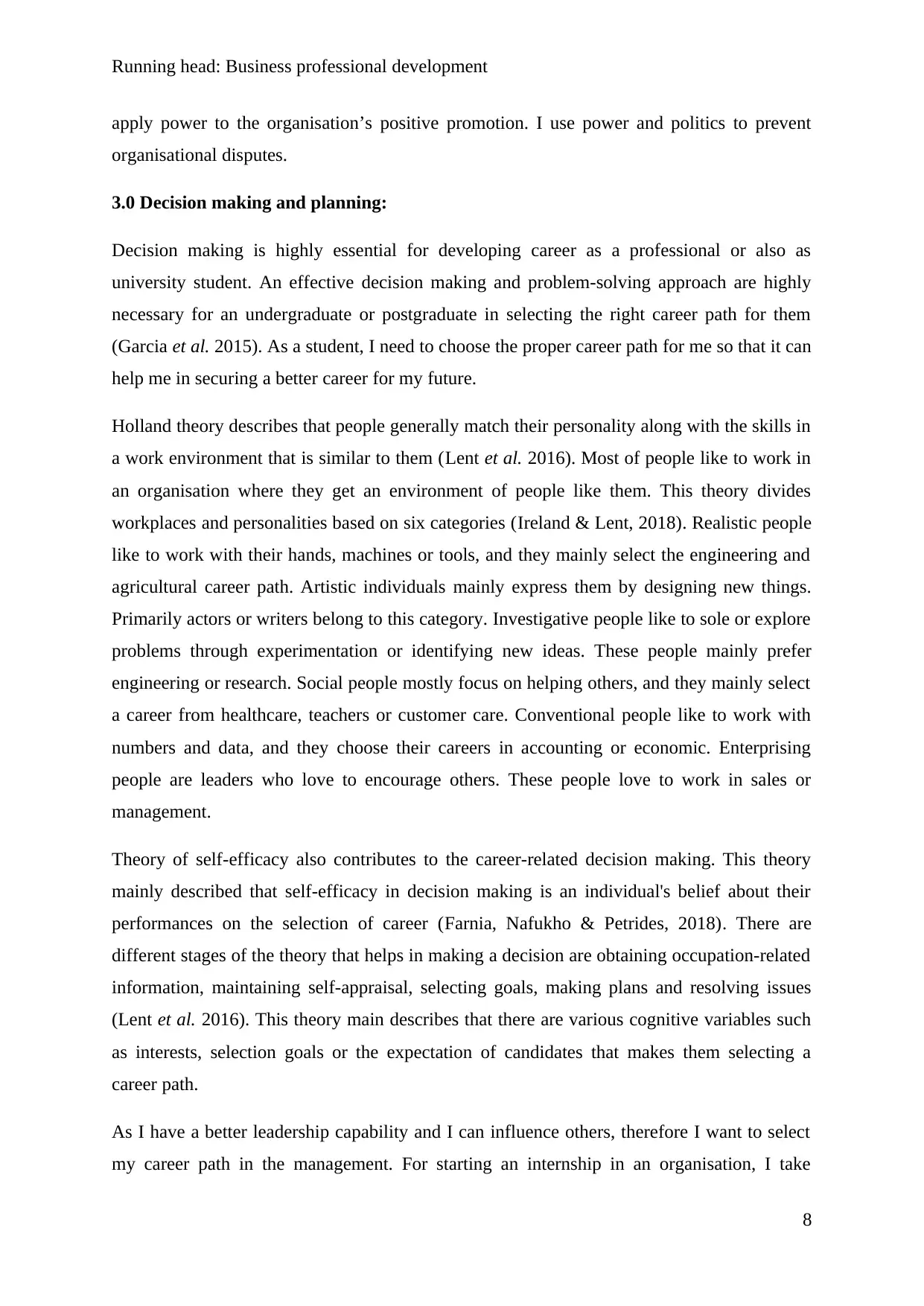
Running head: Business professional development
apply power to the organisation’s positive promotion. I use power and politics to prevent
organisational disputes.
3.0 Decision making and planning:
Decision making is highly essential for developing career as a professional or also as
university student. An effective decision making and problem-solving approach are highly
necessary for an undergraduate or postgraduate in selecting the right career path for them
(Garcia et al. 2015). As a student, I need to choose the proper career path for me so that it can
help me in securing a better career for my future.
Holland theory describes that people generally match their personality along with the skills in
a work environment that is similar to them (Lent et al. 2016). Most of people like to work in
an organisation where they get an environment of people like them. This theory divides
workplaces and personalities based on six categories (Ireland & Lent, 2018). Realistic people
like to work with their hands, machines or tools, and they mainly select the engineering and
agricultural career path. Artistic individuals mainly express them by designing new things.
Primarily actors or writers belong to this category. Investigative people like to sole or explore
problems through experimentation or identifying new ideas. These people mainly prefer
engineering or research. Social people mostly focus on helping others, and they mainly select
a career from healthcare, teachers or customer care. Conventional people like to work with
numbers and data, and they choose their careers in accounting or economic. Enterprising
people are leaders who love to encourage others. These people love to work in sales or
management.
Theory of self-efficacy also contributes to the career-related decision making. This theory
mainly described that self-efficacy in decision making is an individual's belief about their
performances on the selection of career (Farnia, Nafukho & Petrides, 2018). There are
different stages of the theory that helps in making a decision are obtaining occupation-related
information, maintaining self-appraisal, selecting goals, making plans and resolving issues
(Lent et al. 2016). This theory main describes that there are various cognitive variables such
as interests, selection goals or the expectation of candidates that makes them selecting a
career path.
As I have a better leadership capability and I can influence others, therefore I want to select
my career path in the management. For starting an internship in an organisation, I take
8
apply power to the organisation’s positive promotion. I use power and politics to prevent
organisational disputes.
3.0 Decision making and planning:
Decision making is highly essential for developing career as a professional or also as
university student. An effective decision making and problem-solving approach are highly
necessary for an undergraduate or postgraduate in selecting the right career path for them
(Garcia et al. 2015). As a student, I need to choose the proper career path for me so that it can
help me in securing a better career for my future.
Holland theory describes that people generally match their personality along with the skills in
a work environment that is similar to them (Lent et al. 2016). Most of people like to work in
an organisation where they get an environment of people like them. This theory divides
workplaces and personalities based on six categories (Ireland & Lent, 2018). Realistic people
like to work with their hands, machines or tools, and they mainly select the engineering and
agricultural career path. Artistic individuals mainly express them by designing new things.
Primarily actors or writers belong to this category. Investigative people like to sole or explore
problems through experimentation or identifying new ideas. These people mainly prefer
engineering or research. Social people mostly focus on helping others, and they mainly select
a career from healthcare, teachers or customer care. Conventional people like to work with
numbers and data, and they choose their careers in accounting or economic. Enterprising
people are leaders who love to encourage others. These people love to work in sales or
management.
Theory of self-efficacy also contributes to the career-related decision making. This theory
mainly described that self-efficacy in decision making is an individual's belief about their
performances on the selection of career (Farnia, Nafukho & Petrides, 2018). There are
different stages of the theory that helps in making a decision are obtaining occupation-related
information, maintaining self-appraisal, selecting goals, making plans and resolving issues
(Lent et al. 2016). This theory main describes that there are various cognitive variables such
as interests, selection goals or the expectation of candidates that makes them selecting a
career path.
As I have a better leadership capability and I can influence others, therefore I want to select
my career path in the management. For starting an internship in an organisation, I take
8
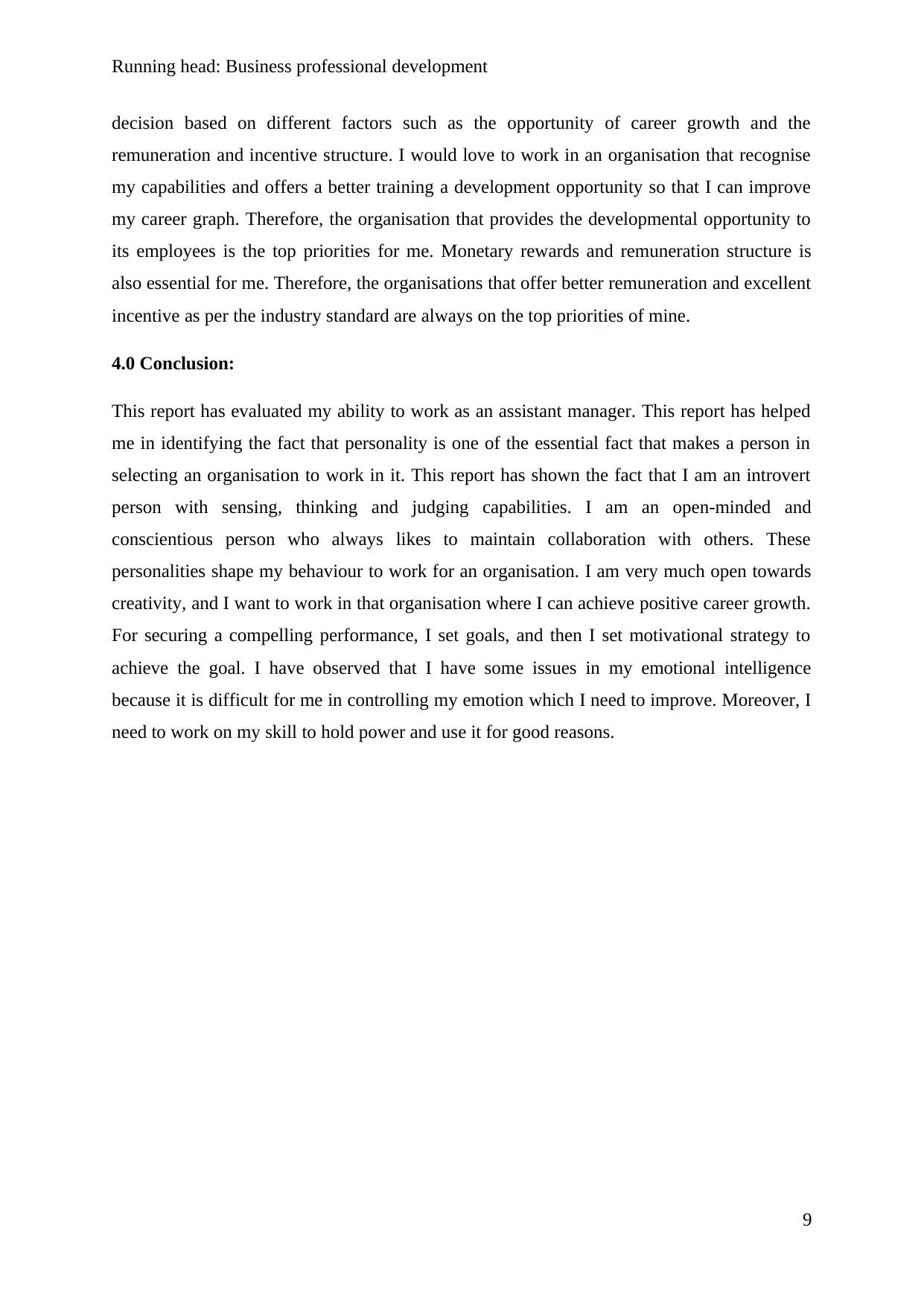
Running head: Business professional development
decision based on different factors such as the opportunity of career growth and the
remuneration and incentive structure. I would love to work in an organisation that recognise
my capabilities and offers a better training a development opportunity so that I can improve
my career graph. Therefore, the organisation that provides the developmental opportunity to
its employees is the top priorities for me. Monetary rewards and remuneration structure is
also essential for me. Therefore, the organisations that offer better remuneration and excellent
incentive as per the industry standard are always on the top priorities of mine.
4.0 Conclusion:
This report has evaluated my ability to work as an assistant manager. This report has helped
me in identifying the fact that personality is one of the essential fact that makes a person in
selecting an organisation to work in it. This report has shown the fact that I am an introvert
person with sensing, thinking and judging capabilities. I am an open-minded and
conscientious person who always likes to maintain collaboration with others. These
personalities shape my behaviour to work for an organisation. I am very much open towards
creativity, and I want to work in that organisation where I can achieve positive career growth.
For securing a compelling performance, I set goals, and then I set motivational strategy to
achieve the goal. I have observed that I have some issues in my emotional intelligence
because it is difficult for me in controlling my emotion which I need to improve. Moreover, I
need to work on my skill to hold power and use it for good reasons.
9
decision based on different factors such as the opportunity of career growth and the
remuneration and incentive structure. I would love to work in an organisation that recognise
my capabilities and offers a better training a development opportunity so that I can improve
my career graph. Therefore, the organisation that provides the developmental opportunity to
its employees is the top priorities for me. Monetary rewards and remuneration structure is
also essential for me. Therefore, the organisations that offer better remuneration and excellent
incentive as per the industry standard are always on the top priorities of mine.
4.0 Conclusion:
This report has evaluated my ability to work as an assistant manager. This report has helped
me in identifying the fact that personality is one of the essential fact that makes a person in
selecting an organisation to work in it. This report has shown the fact that I am an introvert
person with sensing, thinking and judging capabilities. I am an open-minded and
conscientious person who always likes to maintain collaboration with others. These
personalities shape my behaviour to work for an organisation. I am very much open towards
creativity, and I want to work in that organisation where I can achieve positive career growth.
For securing a compelling performance, I set goals, and then I set motivational strategy to
achieve the goal. I have observed that I have some issues in my emotional intelligence
because it is difficult for me in controlling my emotion which I need to improve. Moreover, I
need to work on my skill to hold power and use it for good reasons.
9
⊘ This is a preview!⊘
Do you want full access?
Subscribe today to unlock all pages.

Trusted by 1+ million students worldwide
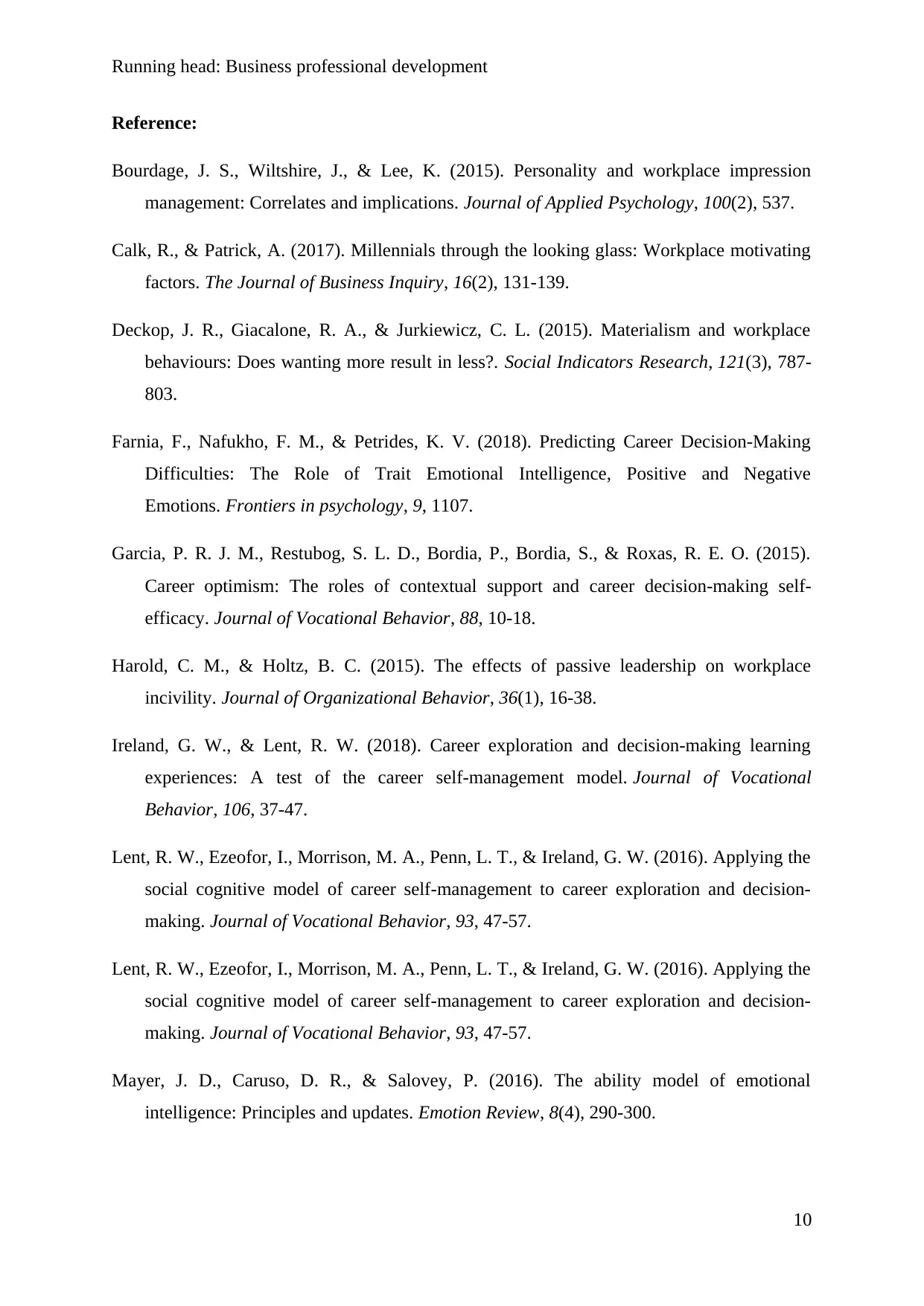
Running head: Business professional development
Reference:
Bourdage, J. S., Wiltshire, J., & Lee, K. (2015). Personality and workplace impression
management: Correlates and implications. Journal of Applied Psychology, 100(2), 537.
Calk, R., & Patrick, A. (2017). Millennials through the looking glass: Workplace motivating
factors. The Journal of Business Inquiry, 16(2), 131-139.
Deckop, J. R., Giacalone, R. A., & Jurkiewicz, C. L. (2015). Materialism and workplace
behaviours: Does wanting more result in less?. Social Indicators Research, 121(3), 787-
803.
Farnia, F., Nafukho, F. M., & Petrides, K. V. (2018). Predicting Career Decision-Making
Difficulties: The Role of Trait Emotional Intelligence, Positive and Negative
Emotions. Frontiers in psychology, 9, 1107.
Garcia, P. R. J. M., Restubog, S. L. D., Bordia, P., Bordia, S., & Roxas, R. E. O. (2015).
Career optimism: The roles of contextual support and career decision-making self-
efficacy. Journal of Vocational Behavior, 88, 10-18.
Harold, C. M., & Holtz, B. C. (2015). The effects of passive leadership on workplace
incivility. Journal of Organizational Behavior, 36(1), 16-38.
Ireland, G. W., & Lent, R. W. (2018). Career exploration and decision-making learning
experiences: A test of the career self-management model. Journal of Vocational
Behavior, 106, 37-47.
Lent, R. W., Ezeofor, I., Morrison, M. A., Penn, L. T., & Ireland, G. W. (2016). Applying the
social cognitive model of career self-management to career exploration and decision-
making. Journal of Vocational Behavior, 93, 47-57.
Lent, R. W., Ezeofor, I., Morrison, M. A., Penn, L. T., & Ireland, G. W. (2016). Applying the
social cognitive model of career self-management to career exploration and decision-
making. Journal of Vocational Behavior, 93, 47-57.
Mayer, J. D., Caruso, D. R., & Salovey, P. (2016). The ability model of emotional
intelligence: Principles and updates. Emotion Review, 8(4), 290-300.
10
Reference:
Bourdage, J. S., Wiltshire, J., & Lee, K. (2015). Personality and workplace impression
management: Correlates and implications. Journal of Applied Psychology, 100(2), 537.
Calk, R., & Patrick, A. (2017). Millennials through the looking glass: Workplace motivating
factors. The Journal of Business Inquiry, 16(2), 131-139.
Deckop, J. R., Giacalone, R. A., & Jurkiewicz, C. L. (2015). Materialism and workplace
behaviours: Does wanting more result in less?. Social Indicators Research, 121(3), 787-
803.
Farnia, F., Nafukho, F. M., & Petrides, K. V. (2018). Predicting Career Decision-Making
Difficulties: The Role of Trait Emotional Intelligence, Positive and Negative
Emotions. Frontiers in psychology, 9, 1107.
Garcia, P. R. J. M., Restubog, S. L. D., Bordia, P., Bordia, S., & Roxas, R. E. O. (2015).
Career optimism: The roles of contextual support and career decision-making self-
efficacy. Journal of Vocational Behavior, 88, 10-18.
Harold, C. M., & Holtz, B. C. (2015). The effects of passive leadership on workplace
incivility. Journal of Organizational Behavior, 36(1), 16-38.
Ireland, G. W., & Lent, R. W. (2018). Career exploration and decision-making learning
experiences: A test of the career self-management model. Journal of Vocational
Behavior, 106, 37-47.
Lent, R. W., Ezeofor, I., Morrison, M. A., Penn, L. T., & Ireland, G. W. (2016). Applying the
social cognitive model of career self-management to career exploration and decision-
making. Journal of Vocational Behavior, 93, 47-57.
Lent, R. W., Ezeofor, I., Morrison, M. A., Penn, L. T., & Ireland, G. W. (2016). Applying the
social cognitive model of career self-management to career exploration and decision-
making. Journal of Vocational Behavior, 93, 47-57.
Mayer, J. D., Caruso, D. R., & Salovey, P. (2016). The ability model of emotional
intelligence: Principles and updates. Emotion Review, 8(4), 290-300.
10
Paraphrase This Document
Need a fresh take? Get an instant paraphrase of this document with our AI Paraphraser
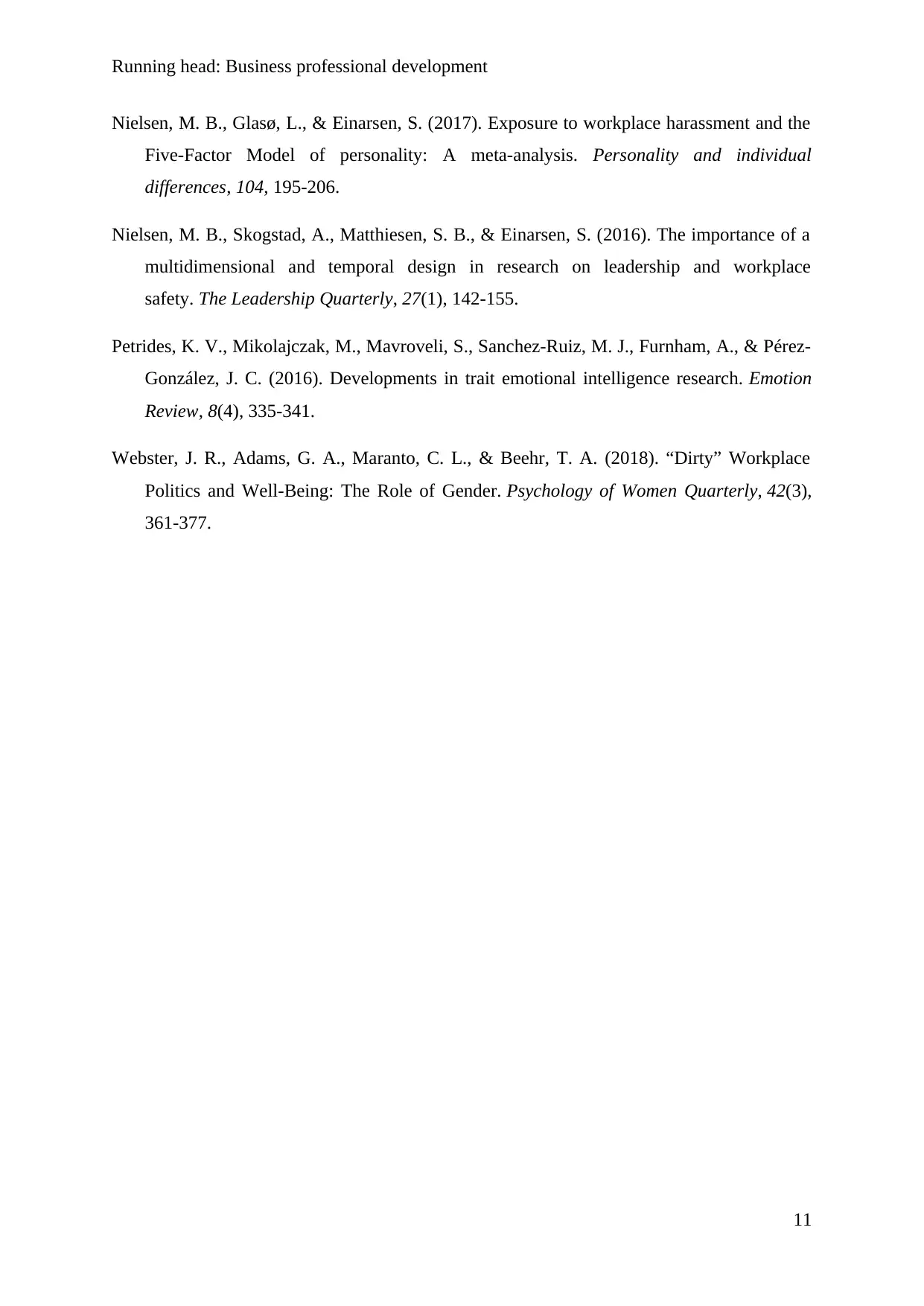
Running head: Business professional development
Nielsen, M. B., Glasø, L., & Einarsen, S. (2017). Exposure to workplace harassment and the
Five-Factor Model of personality: A meta-analysis. Personality and individual
differences, 104, 195-206.
Nielsen, M. B., Skogstad, A., Matthiesen, S. B., & Einarsen, S. (2016). The importance of a
multidimensional and temporal design in research on leadership and workplace
safety. The Leadership Quarterly, 27(1), 142-155.
Petrides, K. V., Mikolajczak, M., Mavroveli, S., Sanchez-Ruiz, M. J., Furnham, A., & Pérez-
González, J. C. (2016). Developments in trait emotional intelligence research. Emotion
Review, 8(4), 335-341.
Webster, J. R., Adams, G. A., Maranto, C. L., & Beehr, T. A. (2018). “Dirty” Workplace
Politics and Well-Being: The Role of Gender. Psychology of Women Quarterly, 42(3),
361-377.
11
Nielsen, M. B., Glasø, L., & Einarsen, S. (2017). Exposure to workplace harassment and the
Five-Factor Model of personality: A meta-analysis. Personality and individual
differences, 104, 195-206.
Nielsen, M. B., Skogstad, A., Matthiesen, S. B., & Einarsen, S. (2016). The importance of a
multidimensional and temporal design in research on leadership and workplace
safety. The Leadership Quarterly, 27(1), 142-155.
Petrides, K. V., Mikolajczak, M., Mavroveli, S., Sanchez-Ruiz, M. J., Furnham, A., & Pérez-
González, J. C. (2016). Developments in trait emotional intelligence research. Emotion
Review, 8(4), 335-341.
Webster, J. R., Adams, G. A., Maranto, C. L., & Beehr, T. A. (2018). “Dirty” Workplace
Politics and Well-Being: The Role of Gender. Psychology of Women Quarterly, 42(3),
361-377.
11
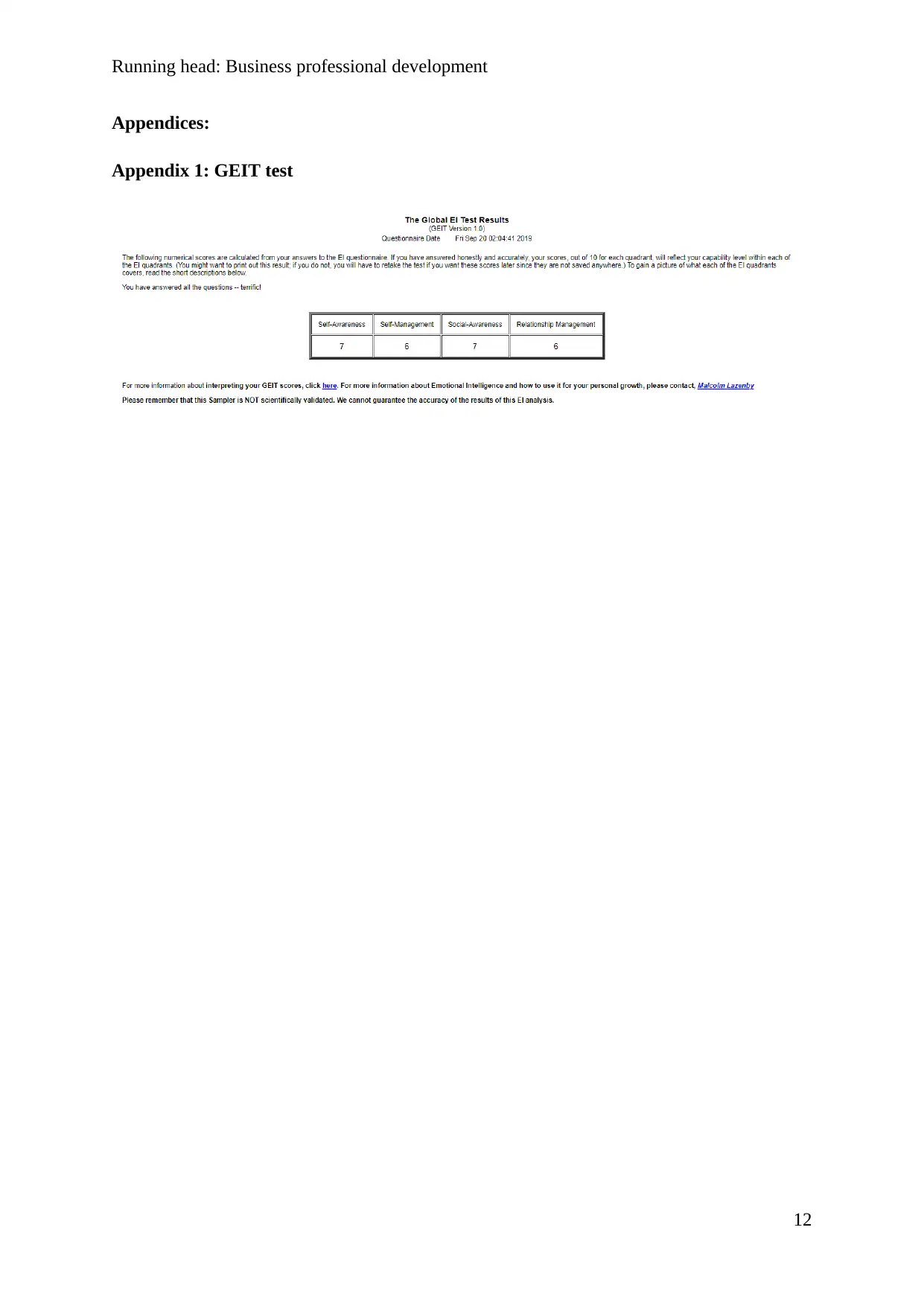
Running head: Business professional development
Appendices:
Appendix 1: GEIT test
12
Appendices:
Appendix 1: GEIT test
12
⊘ This is a preview!⊘
Do you want full access?
Subscribe today to unlock all pages.

Trusted by 1+ million students worldwide
1 out of 14
Related Documents
Your All-in-One AI-Powered Toolkit for Academic Success.
+13062052269
info@desklib.com
Available 24*7 on WhatsApp / Email
![[object Object]](/_next/static/media/star-bottom.7253800d.svg)
Unlock your academic potential
Copyright © 2020–2026 A2Z Services. All Rights Reserved. Developed and managed by ZUCOL.



